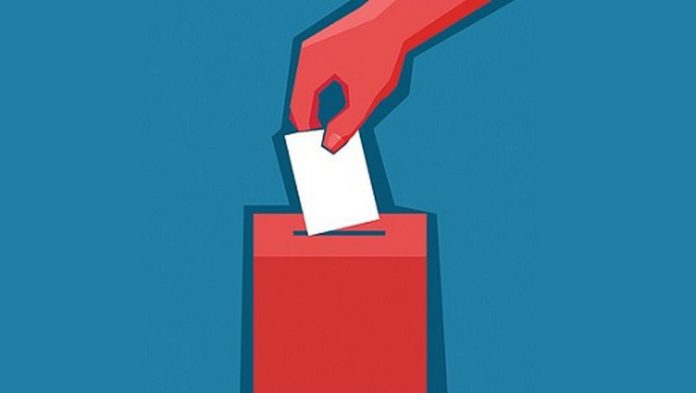This article is written by Sarthak Kulshrestha, from Jagran Lakecity University, Bhopal. This article deals with the Election Commission of India and the need for independent functioning of the same, to conduct free and fair elections regularly.
Table of Contents
Introduction
The Election Commission of India (ECI) has been established under Article 324 of our Constitution which empowers the ECI to superintend, direct and control all the elections to the Parliament as well as to the State Legislative Assemblies since it is common to both the Central government and state governments. It is set up as the permanent autonomous body which is responsible to conduct free and fair elections all over the country.
It was established on January 25th, 1950 to manage and conduct the elections and as a Constitutional body, it is also responsible to oversee the entire process of election to the office of the President, Vice-President and Rajya Sabha members through indirect elections. However, the ECI has nothing to do with the elections to the Panchayati Raj Institutions and Municipalities. A separate Constitutional body called State Election Commission (SEC) has been established to administer and conduct the election to these local governing bodies.
India, along with some other countries like Canada, UK, Australia, Sri Lanka and South Africa, follows the independent electoral model. Such an electoral model ensures the independent functioning of the Election Commission without much interference from the government. In a democratic country like ours, elections hold great importance as they provide the common people with their political representatives to work as per their requirements and demands while holding office in the government. The elections held periodically are the democratic processes that ensure the smooth functioning of the government in which those in power can represent the interests of the people who elected them. This article deals with the Election Commission of India in detail and also the extent of independence which has to be ensured to the ECI for its efficient working in a Parliamentary democracy.
Who is an Election Commissioner
Article 324 of the Constitution of India provides the composition of the ECI with the Chief Election Commissioner (CEC) and the President may appoint several other Election Commissioners, from time to time fixing the appointment of Chief Election Commissioner and other Election Commissioners. The CEC acts as the chairman of the Election Commission when any other Election Commissioner is appointed. The ECI comprises a Chief Election Commissioner and two other Election Commissioners. Thus, making it a multi-member body. Each of them holds the office for a fixed tenure which can be 6 years or until 65 years of age, whichever is earlier. Following consultation with the Election Commission, the President may also appoint regional Commissioners to assist the Election Commission to perform the functions as given under Article 324(1) of the Constitution of India. The condition of service of Election Commissioners and Regional Commissioners is determined by the President and the Election Commissioners cannot be removed except in the manner in which the judges of the Supreme Court are removed.
The powers exercised by the Election Commission are generally classified into three types:
Advisory powers: The Election Commissioner exercises the advisory powers usually in post-election scenarios as he is empowered to advise the President of India or Governor to disqualify the sitting members of the Parliament or State legislature who are found ineligible. It is also empowered to advise the High Courts and the Supreme Court in matters of disputes arising after the elections.
Quasi-judicial powers: The Election Commission is empowered to settle the disputes between the candidates or the political parties. It also decides the disputes regarding the allotment of election symbols & administrative powers. The Election Commissioner can disqualify an individual who is found guilty of any malpractice or non-compliance with any law.
Administrative powers: The Election Commission has the power to ensure proper administration of the elections and for the same, it enforces the Model Code of Conduct for election campaigns. It has been given powers to register or deregister the political parties and also to keep a check on the expenses of the political party. It also appoints the election observers from various departments of civil services to perform the election duties.
The Chief Election Commissioner (CEC) is usually referred to as first among equals in the Election Commission where two other Election Commissioners are also appointed. The CEC is created under the Constitution and can be removed from office in the manner and grounds on which the judges of the Supreme Court are removed. But the other Commissioners hold their office during the pleasure of the President of India. So, it can be said that the factor of removal of CEC, the equal salary of both CEC & EC/ECs does not confer any higher status on the CEC.
In T.N. Seshan, CEC of India v. Union of India (1995), it was held that the CEC cannot be considered as superior on the ground that its decision is final because in such a case, the CEC can render the EC as non-functional, thus affecting the smooth mechanism and functions of the ECI. The Court thereby rejected the argument that the ECs function only to put forth advice to the CEC.
Independence of Election Commissioner – why is it necessary in India
The Election Commissioner is supposed to function independently as an autonomous Constitutional body. The independence is ensured under the Constitution by its separate functioning like other commissions as well as by the limited scope of the removal of CEC as provided in the proviso to Clause(5) of Article 324.
This would help the Election Commissioner to exercise their powers without any external pressure and its autonomous functioning can be expected. In a democratic country like India, where a multi-party system is followed, the role of the Election Commissioner becomes even more crucial. In such a vast country, the advisory, quasi-judicial and administrative functions of this body have much more significance as elections take place on a large scale from time to time, thus it becomes very important for the Election Commissioner to be able to perform these functions independently without getting influenced to complete the election process fairly.
However, the independent functioning of the Election Commissioner is not seen practically on the ground. There are some areas of concern such as the selection procedure of Election Commissioners, as they are appointed by the President on recommendations of the Central Government, so it creates room for partiality during the electoral process.
Also, the Constitution has not locked out the retiring election commissioners from any further appointment by the government. The government uses this loophole for compromising the independence of members.
The independence of the Election Commissioner has come into question recently in the State legislative assembly elections held in West Bengal, Assam, Tamil Nadu, Kerala, and Puducherry. The Madras HC blamed the Election Commissioner for local Covid-19 cases in these areas due to the multi-phased elections, which were conducted without considering the transmission risk of the virus under the 2nd wave of the pandemic, and the Chief Election Commissioner moved the Supreme Court against the order of Madras High Court in the case of Chief Election Commissioner of India v. M.R Vijayabhaskar & Ors (2021).
The Election Commissioner approached the Supreme Court but the SC has also denied the relief to the Election Commissioner. It is observable that despite being empowered enough to manage the election process carefully and fairly, the Election Commissioner failed to do it accordingly. This implies the influence of government control over the Election Commission.
Freedom from governmental control
The Election Commissioner of India is not seen as completely independent from government control. The EC did not seem interested in merging the rounds of an election when it was needed in wake of the pandemic. Also, in the demarcation of the phases of election, the Election Commissioner appeared to be in the favor of the Central government. All such irregularities affected the credibility of the Election Commissioner to a great extent. Thus, it becomes really necessary for the Election Commissioner to work as a separate body, ensuring complete freedom from governmental control to remain independent because such external influence on their work adversely affects the election processes which often goes against democratic principles.
Free and fair elections
If the EC fails to secure its independence and lets the authoritative control of the government hinder its functioning, free and fair elections would not be possible. Free and fair elections include various aspects of a transparent process of election, such as the delimitation of constituencies, preparation, revision of amendment and electoral rolls, etc. The main idea behind free and fair elections is political liberty and equality, and to ensure that no one, while exercising their right to vote, faces any party influence or discrimination on grounds of caste, creed, sex, religion, race, language, etc.
Moreover, malfunctioning of EVMs has been alleged many times which raises the question of the Election Commissioner, who is responsible to ensure the smooth and fair administration of the elections. The influence of money and muscle power is also common in our country, as the entry of many moneyed and powerful candidates in the Parliament and the state legislature is often criticized. Voter bribery, booth capturing and manipulation by the media are some of the unethical techniques which prevent the elections to go freely and fairly for which the Election Commissioner is responsible.
Prevention of misconduct by election candidates/parties
As we already know that the Election Commissioner is supposed to supervise, manage and conduct the elections in a free and fair manner, it is also necessary that the political parties or candidates involved in a particular election follow the Model Code of Conduct (MCC). MCC is a set of guidelines issued by the EC for the proper regulation of the candidates and the parties. It contains eight provisions that deal with general conduct, meetings, processions, polling day, polling booths, observers, and also the party in power. The code of conduct is to be followed in a way of not posing undue influence over voters. In 2013, the Standing Committee on Personnel, Public grievances, law, and Justice recommended making the MCC binding by making it a part of the Representation of the People Act, 1951.
Control over government officers performing election duties
The government officers performing election duties are ought to perform their duties following the just and impartial procedure. The Chief Municipal Electoral Officers are duty-bound to conduct the elections and assist the returning officers to complete the forms and respond to community inquiries during the electoral process.
Quality decisions on problems related to elections
There have been various landmark judgments of the Supreme Court on the problems related to elections. Some of them are as follows:
P.R. Balagali v. B.D.Jatti (1971)
The Supreme Court, in its decision in P.R. Balagadi v. B.D. Jatti (1971), made it clear that the election law mainly exists to safeguard the purity of the elections and make sure people do not get elected by using unfair means or breach of the election law.
P.A. Sangma v. Pranab Mukherjee (2012)
The Supreme Court, in the case of P.A. Sangma v. Pranab Mukherjee (2012), dismissed the petition against the election of Pranab Mukherjee on the ground of not disclosing the matter to pass the stage of early scrutiny. The orders of the Election Commission are subject to judicial review if the court finds it partial or unfair.
Union of India v. Association for Democratic Reforms, (2002)
The phrase “conduct of the election” was laid down in Union of India v. Association for Democratic Reforms, (2002)5.SCC 249 through which it held that superintendence and management of elections by the Election Commissioner include a study of all the expenses incurred by the political parties and conduct of elections is a wider phrase which also includes the power to issue directions to the parties for conducting the elections in which they are supposed to give all the necessary details.
Lily Thomas v. UoI & Ors, Writ Petition (Civil) No. 490 OF 2005
The SC in Lily Thomas v. UoI & Ors (2013) held that any MP, MLA, or even MLC (Member of Legislative Council) who is convicted of a crime of more than two years, will be disqualified as an elected representative on the date when he was convicted. This judgment was a landmark to put the stopper on the growing criminalization of politics.
The judiciary keeps on delivering quality decisions from time to time to ensure independent and fair functioning of the EC, as well as to safeguard the democracy by free and fair elections as it is required.
Conclusion
Considering the various irregularities and inconsistencies, it is high time for the Election Commission of India to reform its functioning. It should be able to uphold the basic features of the system such as rule of law, the sovereignty of the nation, supremacy of the Constitution and, the principle of freedom and fairness in an election. The ECI must be made free from every kind of external influence of the government so that it can work independently, and let the government employees work impartially when they are assigned their duties in the elections. To hold the spirit of democracy, the voters must be able to elect their political representatives through free and fair election processes. To achieve such an error-free and transparent methodology, new technologies must be used so that the administrative efficacy could be improved in the elections. Also, the selection of the Election Commissioners needs some reforms and the Constitutional protection granted to the Election Commissioners regarding their tenure is more than needed, which also needs to be addressed.
There should be fair electoral procedures to safeguard the independence of the Election Commission and run the elections smoothly for the sake of democratic representation of the people in the legislature.
References
- https://www.ijlmh.com/wp-content/uploads/2020/02/Election-commission-of-india-and-its-independence%E2%80%94a-critical.pdf
- https://legislative.gov.in/sites/default/files/COI_1.pdf
- http://www.legalserviceindia.com/legal/article-2032-election-commission-of-india-articles-324-to-329-.html
LawSikho has created a telegram group for exchanging legal knowledge, referrals, and various opportunities. You can click on this link and join:
https://t.me/joinchat/J_0YrBa4IBSHdpuTfQO_sA
Follow us on Instagram and subscribe to our YouTube channel for more amazing legal content.
 Serato DJ Crack 2025Serato DJ PRO Crack
Serato DJ Crack 2025Serato DJ PRO Crack










 Allow notifications
Allow notifications


